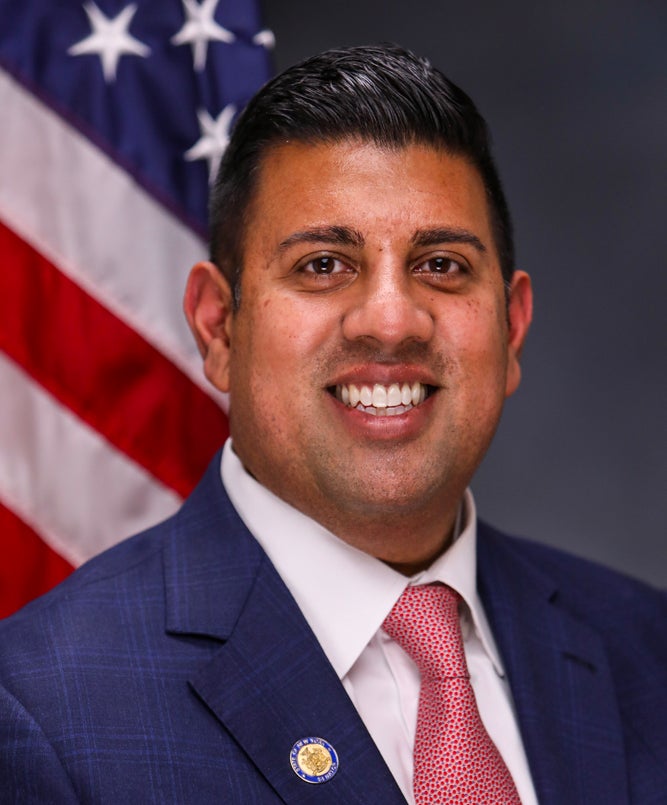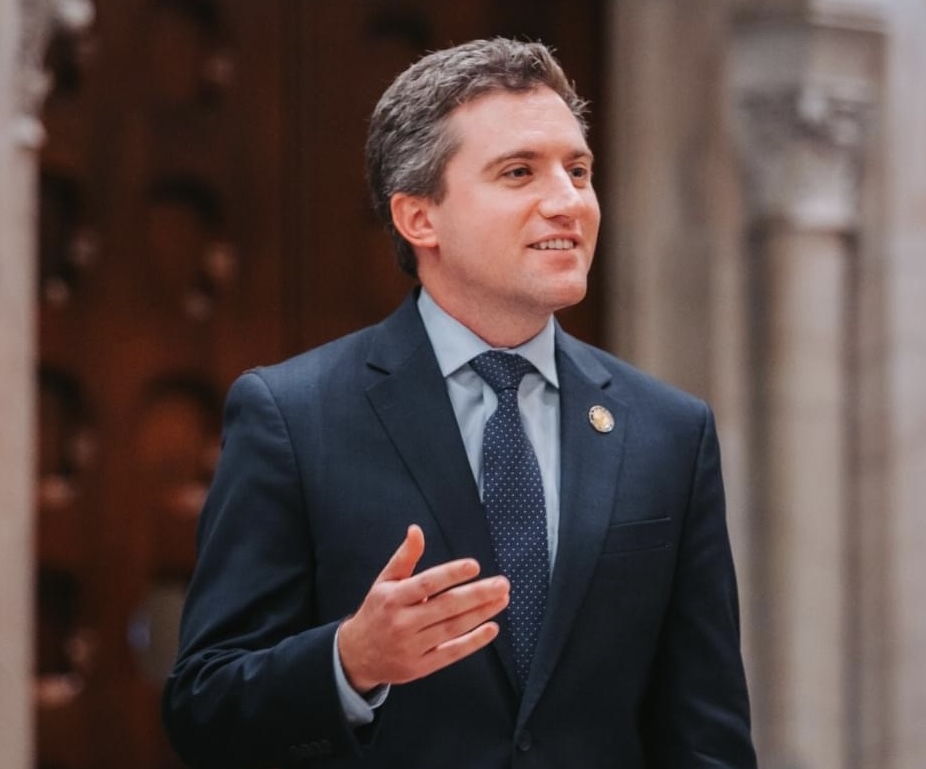
Find your Senator and share your views on important issues.
Exempts COVID-19 stimulus relief for individuals and families with children from money judgments

(D) 6th Senate District
| Assembly Actions - Lowercase Senate Actions - UPPERCASE | |
|---|---|
| May 13, 2021 | signed chap.107 |
| May 11, 2021 | delivered to governor |
| Apr 28, 2021 | returned to assembly passed senate 3rd reading cal.695 substituted for s5923a |
| Apr 28, 2021 | substituted by a6617a |
| Apr 26, 2021 | advanced to third reading |
| Apr 21, 2021 | 2nd report cal. |
| Apr 20, 2021 | 1st report cal.695 |
| Mar 29, 2021 | print number 5923a |
| Mar 29, 2021 | amend and recommit to judiciary |
| Mar 23, 2021 | referred to judiciary |
See Assembly Version of this Bill: A6617 Law Section: Civil Practice Law and Rules Laws Affected: Amd §§5205, 5222 & 5222-a, CPLR; amd §9-g, Bank L; amd §3, D & C L
Exempts COVID-19 stimulus relief for individuals and families with children from money judgments; provides that in services of notices, forms, and procedures for claims of exemptions that a restraining notice or notice of levy by execution issued against a bank account shall have language to inform the holder of such account that funds for COVID-19 stimulus relief for individuals and families with children are exempt and cannot be taken.
BILL NUMBER: S5923 Revised 3/23/2021 SPONSOR: THOMAS TITLE OF BILL: An act to amend the civil practice law and rules, the banking law and the debtor and creditor law, in relation to exempting COVID-19 stimulus relief for individuals and families with children from money judgments PURPOSE OR GENERAL IDEA OF BILL: To protect payments made to individuals under prescribed emergency relief statutes, which are intended to help New Yorkers during unprecedented loss of employment and other detrimental economic impacts, from collection to satisfy money judgments, from set off, and from transfer or assignment. SUMMARY OF SPECIFIC PROVISIONS: Section 1 of the bill amends section 5205 of the civil practice law and rules to make all payments made to individuals under prescribed federal
emergency relief statutes exempt from application to the satisfaction of a money judgment. Section 2 amends section 5222 of the civil practice law and rules to list COVID-19 stimulus relief on a restraining notice as money or prop- erty that is exempt from judgment creditors. Section 3 amends section 5222-a of the civil practice law and rules to list COVID-19 stimulus relief as a claimed exemption on the exemption claim form that a debtor must complete to release restrained funds. Section 4 amends section 9-g of the banking law to prohibit set off against emergency relief and stimulus payments as defined in Section 1 of the bill. Section 5 amends section 3 of the debtor and creditor law to prohibit transfer or assignment of all payments under prescribed federal emergen- cy relief statutes. Section 6 is the effective date. JUSTIFICATION: The federal Families First Coronavirus Response Act (FFCRA), Coronavirus Aid, Relief, and Economic Security Act of 2020 (CARES Act), Consolidated Appropriations Act 2021, and American Rescue Plan Act of 2021 (ARPA) provided relief payments to individuals and families with children to ameliorate the unprecedented economic and health consequences of the COVID-19 pandemic, which has disproportionately harmed communities of color. These relief payments include payments in the form of tax refunds, recovery rebates, tax credits, and advanced payment of tax credits. The legislature finds that New Yorkers should have the opportunity to use the full benefit of the financial assistance provided by these federal acts. The funds are intended to help people meet their financial needs, including to pay for food, rent, utilities, medicine, and other basic necessities. Any execution, levy, attachment, garnishment, or other legal process to seize these funds deprives recipients of the ability to support themselves and their families--including the ability to provide for children who have suffered significant food insecurity as a result of the pandemic--and increases racial inequity. The federal laws that authorized these payments did not consistently include explicit language designating the relief payments as protected from seizure to satisfy judgments, from set off, or from transfer or assignment. It would be folly and against public policy for these relief payments to be subject to seizure, set off, transfer or assignment as described above, and the legislature intends to rectify the situation through this legislation, including by codifying the protections for stimulus payments set forth in guidance issued by the office of the attorney general. This legislation puts to bed any potential arguments that relief payments originating from these federal laws are subject to garnishment and to clarify that all relief payments to New Yorkers under these federal acts, including all funds related to children, all funds New Yorkers qualified for or received prior to the effective date, and all funds that are restrained but that have not been levied as of the effec- tive date, are protected. PRIOR LEGISLATIVE HISTORY: New bill. FISCAL IMPLICATIONS: None to the state. EFFECTIVE DATE: This act shall take effect immediately.
S T A T E O F N E W Y O R K ________________________________________________________________________ 5923 2021-2022 Regular Sessions I N S E N A T E March 23, 2021 ___________ Introduced by Sen. THOMAS -- read twice and ordered printed, and when printed to be committed to the Committee on Judiciary AN ACT to amend the civil practice law and rules, the banking law and the debtor and creditor law, in relation to exempting COVID-19 stimu- lus relief for individuals and families with children from money judg- ments THE PEOPLE OF THE STATE OF NEW YORK, REPRESENTED IN SENATE AND ASSEM- BLY, DO ENACT AS FOLLOWS: Section 1. Paragraph 2 of subdivision (l) of section 5205 of the civil practice law and rules, as amended by chapter 24 of the laws of 2009, is amended and a new subdivision (p) is added to read as follows: 2. For purposes of this article, "statutorily exempt payments" means any personal property exempt from application to the satisfaction of a money judgment under any provision of state or federal law. Such term shall include, but not be limited to, payments from any of the following sources: social security, including retirement, survivors' and disabili- ty benefits, supplemental security income or child support payments; veterans administration benefits; public assistance; workers' compen- sation; unemployment insurance; public or private pensions; railroad retirement; [and] black lung benefits; AND EMERGENCY RELIEF FUNDS. (P) EXEMPTION FOR EMERGENCY RELIEF FUNDS. ANY PAYMENTS TO INDIVIDUALS, INCLUDING TAX REFUNDS, RECOVERY REBATES, REFUNDABLE TAX CREDITS, AND ANY ADVANCES OF ANY TAX CREDITS, UNDER THE FEDERAL FAMILIES FIRST CORONAVI- RUS RESPONSE ACT (FFCRA), CORONAVIRUS AID, RELIEF, AND ECONOMIC SECURITY ACT OF 2020 (CARES ACT), CONSOLIDATED APPROPRIATIONS ACT OF 2021, AND AMERICAN RESCUE PLAN ACT OF 2021 (ARPA), EXCEPT PAYMENTS LEVIED AS OF THE EFFECTIVE DATE, ARE EXEMPT FROM APPLICATION TO THE SATISFACTION OF A MONEY JUDGMENT. § 2. Subdivision (e) of section 5222 of the civil practice law and rules, as amended by chapter 575 of the laws of 2008, is amended to read as follows: EXPLANATION--Matter in ITALICS (underscored) is new; matter in brackets [ ] is old law to be omitted.
LBD10569-02-1 S. 5923 2 (e) Content of notice. The notice required by subdivision (d) of this section shall be in substantially the following form and may be included in the restraining notice: NOTICE TO JUDGMENT DEBTOR OR OBLIGOR Money or property belonging to you may have been taken or held in order to satisfy a judgment or order which has been entered against you. Read this carefully. YOU MAY BE ABLE TO GET YOUR MONEY BACK State and federal laws prevent certain money or property from being taken to satisfy judgments or orders. Such money or property is said to be "exempt". The following is a partial list of money which may be exempt: 1. Supplemental security income, (SSI); 2. Social security; 3. Public assistance (welfare); 4. Spousal support, maintenance (alimony) or child support; 5. Unemployment benefits; 6. Disability benefits; 7. Workers' compensation benefits; 8. Public or private pensions; 9. Veterans benefits; 10. Ninety percent of your wages or salary earned in the last sixty days; 11. Twenty-five hundred dollars of any bank account containing statu- torily exempt payments that were deposited electronically or by direct deposit within the last forty-five days, including, but not limited to, your social security, supplemental security income, veterans benefits, public assistance, workers' compensation, unemployment insurance, public or private pensions, railroad retirement benefits, black lung benefits, or child support payments; 12. Railroad retirement; [and] 13. Black lung benefits; AND 14. COVID-19 STIMULUS RELIEF FOR INDIVIDUALS AND FAMILIES WITH CHIL- DREN. If you think that any of your money that has been taken or held is exempt, you must act promptly because the money may be applied to the judgment or order. If you claim that any of your money that has been taken or held is exempt, you may contact the person sending this notice. Also, YOU MAY CONSULT AN ATTORNEY, INCLUDING ANY FREE LEGAL SERVICES ORGANIZATION IF YOU QUALIFY. You can also go to court without an attor- ney to get your money back. Bring this notice with you when you go. You are allowed to try to prove to a judge that your money is exempt from collection under New York civil practice law and rules, sections fifty- two hundred twenty-two-a, fifty-two hundred thirty-nine and fifty-two hundred forty. If you do not have a lawyer, the clerk of the court may give you forms to help you prove your account contains exempt money that the creditor cannot collect. The law (New York civil practice law and rules, article four and sections fifty-two hundred thirty-nine and fifty-two hundred forty) provides a procedure for determination of a claim to an exemption. § 3. Paragraph 4 of subdivision (b) of section 5222-a of the civil practice law and rules, as added by chapter 575 of the laws of 2008, is amended to read as follows: 4. Content of exemption notice and exemption claim form. a. The exemption notice shall be in the following form: S. 5923 3 "EXEMPTION NOTICE as required by New York Law YOUR BANK ACCOUNT IS RESTRAINED OR "FROZEN" The attached Restraining Notice or notice of Levy by Execution has been issued against your bank account. You are receiving this notice because a creditor has obtained a money judgment against you, and one or more of your bank accounts has been restrained to pay the judgment. A money judgment is a court's decision that you owe money to a creditor. You should be aware that FUTURE DEPOSITS into your account(s) might also be restrained if you do not respond to this notice. You may be able to "vacate" (remove) the judgment. If the judgment is vacated, your bank account will be released. Consult an attorney (including free legal services) or visit the court clerk for more infor- mation about how to do this. Under state and federal law, certain types of funds cannot be taken from your bank account to pay a judgment. Such money is said to be "exempt." DOES YOUR BANK ACCOUNT CONTAIN ANY OF THE FOLLOWING TYPES OF FUNDS? 1. Social security; 2. Social security disability (SSD); 3. Supplemental security income (SSI); 4. Public assistance (welfare); 5. Income earned while receiving SSI or public assistance; 6. Veterans benefits; 7. Unemployment insurance; 8. Payments from pensions and retirement accounts; 9. Disability benefits; 10. Income earned in the last 60 days (90% of which is exempt); 11. Workers' compensation benefits; 12. Child support; 13. Spousal support or maintenance (alimony); 14. Railroad retirement; [and/or] 15. Black lung benefits; AND/OR 16. COVID-19 STIMULUS RELIEF FOR INDIVIDUALS AND FAMILIES WITH CHILDREN. If YES, you can claim that your money is exempt and cannot be taken. To make the claim, you must (a) complete the EXEMPTION CLAIM FORM attached; (b) deliver or mail the form to the bank with the restrained or "frozen" account; and (c) deliver or mail the form to the creditor or its attorney at the address listed on the form. You must send the forms within 20 DAYS of the postmarked date on the envelope holding this notice. You may be able to get your account released faster if you send to the creditor or its attorney written proof that your money is exempt. Proof can include an award letter from the government, an annual statement from your pension, pay stubs, copies of checks, bank records showing the last two months of account activity, or other papers showing that the money in your bank account is exempt. If you send the creditor's attorney proof that the money in your account is exempt, the attorney must release that money within seven days. You do not need an attorney to make an exemption claim using the form." b. The exemption claim form shall be in the following form: NAME OF COURT, NAME OF COUNTY S. 5923 4 -------------------------------------x PLAINTIFF/PETITIONER/CLAIMANT INDEX NO. V. DEFENDANT/RESPONDENT EXEMPTION CLAIM FORM -------------------------------------x NAME AND ADDRESS OF JUDGMENT NAME AND ADDRESS OF FINANCIAL CREDITOR OR ATTORNEY INSTITUTION (To be completed by judgment (To be completed by judgment creditor or attorney) creditor or attorney) ADDRESS ADDRESS A_____________________ B______________________ ____________________ _____________________ Directions: To claim that some or all of the funds in your account are exempt, complete both copies of this form, and make one copy for your- self. Mail or deliver one form to ADDRESS A and one form to ADDRESS B within twenty days of the date on the envelope holding this notice. **If you have any documents, such as an award letter, an annual state- ment from your pension, paystubs, copies of checks or bank records show- ing the last two months of account activity, include copies of the docu- ments with this form. Your account may be released more quickly. _________________________________________________________________________ I state that my account contains the following type(s) of funds (check all that apply): ____Social security ____Social security disability (SSD) ____Supplemental security income (SSI) ____Public assistance ____Wages while receiving SSI or public assistance ____Veterans benefits ____Unemployment insurance ____Payments from pensions and retirement accounts ____Income earned in the last 60 days (90% of which is exempt) ____Child support ____Spousal support or maintenance (alimony) ____Workers' compensation ____Railroad retirement or black lung benefits _____COVID-19 STIMULUS RELIEF FOR INDIVIDUALS AND FAMILIES WITH CHILDREN ____Other (describe exemption):_________________________________ I request that any correspondence to me regarding my claim be sent to the following address: _____________________________________________________________________ (FILL IN YOUR COMPLETE ADDRESS) I certify under penalty of perjury that the statement above is true to the best of my knowledge and belief. _________________________________________________________________________ DATE SIGNATURE OF JUDGMENT DEBTOR S. 5923 5 § 4. Subdivision 1 of section 9-g of the banking law, as added by chapter 10 of the laws of 1980, is amended to read as follows: 1. (A) No banking institution shall assert, claim or exercise any right of set off against any deposit account into which social security or supplemental security income payments are deposited pursuant to an agreement with such banking institution which provides that such payments be deposited directly into such deposit account without presen- tation to the depositor at the time of deposit. (B) NO BANKING INSTITUTION SHALL ASSERT, CLAIM OR EXERCISE ANY RIGHT OF SET OFF AGAINST ANY PAYMENTS REFERRED TO IN SUBDIVISION (P) OF SECTION FIFTY-TWO HUNDRED FIVE OF THE CIVIL PRACTICE LAW AND RULES. § 5. Section 3 of the debtor and creditor law is amended by adding a new fifth undesignated paragraph to read as follows: THE RIGHT OF ANY PERSON TO PAYMENTS, INCLUDING TAX REFUNDS, RECOVERY REBATES, REFUNDABLE TAX CREDITS, AND ANY ADVANCES OF ANY TAX CREDITS, UNDER THE FEDERAL FAMILIES FIRST CORONAVIRUS RESPONSE ACT (FFCRA), CORO- NAVIRUS AID, RELIEF, AND ECONOMIC SECURITY ACT OF 2020 (CARES ACT), CONSOLIDATED APPROPRIATIONS ACT OF 2021, AND AMERICAN RESCUE PLAN ACT OF 2021 (ARPA) SHALL NOT BE TRANSFERABLE OR ASSIGNABLE, AT LAW OR IN EQUI- TY. § 6. This act shall take effect immediately.

(D, WF) Senate District

(D, WF) 25th Senate District

(D) Senate District

(D) 14th Senate District
View additional co-sponsors
(D, WF) 56th Senate District

(D) 26th Senate District

(D, WF) 47th Senate District

(D, WF) 31st Senate District
(D, WF) 28th Senate District

(D, WF) 48th Senate District

(D, WF) Senate District

(D) 10th Senate District

(D) 32nd Senate District

(D) 42nd Senate District
See Assembly Version of this Bill: A6617 Law Section: Civil Practice Law and Rules Laws Affected: Amd §§5205, 5222 & 5222-a, CPLR; amd §9-g, Bank L; amd §3, D & C L
Exempts COVID-19 stimulus relief for individuals and families with children from money judgments; provides that in services of notices, forms, and procedures for claims of exemptions that a restraining notice or notice of levy by execution issued against a bank account shall have language to inform the holder of such account that funds for COVID-19 stimulus relief for individuals and families with children are exempt and cannot be taken.
BILL NUMBER: S5923A Revised 3/26/21 SPONSOR: THOMAS TITLE OF BILL: An act to amend the civil practice law and rules, the banking law and the debtor and creditor law, in relation to exempting COVID-19 stimulus relief for individuals and families with children from money judgments PURPOSE OF BILL: To protect payments made to individuals under prescribed emergency relief statutes, which are intended to help New Yorkers during unprecedented loss of employment and other detrimental economic impacts, from collection to satisfy money judgments, from set off, and from transfer or assignment. SUMMARY OF PROVISIONS: Section 1 of the bill amends section 5205 of the civil practice law and rules to make all payments made to individuals under prescribed federal
emergency relief statutes exempt from application to the satisfaction of a money judgment. Section 2 amends section 5222 of the civil practice law and rules to list COVID-19 stimulus relief on a restraining notice as money or prop- erty that is exempt from judgment creditors. Section 3 amends section 5222-a of the civil practice law and rules to list COVID-19 stimulus relief as a claimed exemption on the exemption claim form that a debtor must complete to release restrained funds. Section 4 amends section 9-g of the banking law to prohibit set off against emergency relief and stimulus payments as defined in Section 1 of the bill. Section 5 amends section 3 of the debtor and creditor law to prohibit transfer or assignment of the right to payments under prescribed federal emergency relief statutes. Section 6 is the effective date. JUSTIFICATION: The federal Families First Coronavirus Response Act (FFCRA), Coronavirus Aid, Relief, and Economic Security Act of 2020 (CARES Act), Consolidated Appropriations Act 2021, and American Rescue Plan Act of 2021 (ARPA) provided relief payments to individuals and families with children to ameliorate the unprecedented economic and health consequences of the COVID-19 pandemic, which has disproportionately harmed communities of color. These relief payments include payments in the form of tax refunds, recovery rebates, tax credits, and advanced payment of tax credits. The legislature finds that New Yorkers should have the opportu- nity to use the full benefit of the financial assistance provided by these federal acts. The funds are intended to help people meet their financial needs, including to pay for food, rent, utilities, medicine, and other basic necessities. Any execution, levy, attachment, garnish- ment, or other legal process to seize these funds deprives recipients of the ability to support themselves and their families--including the ability to provide for children who have suffered significant food inse- curity as a result of the pandemic--and increases racial inequity. The federal laws that authorized these payments did not consistently include explicit language designating the relief payments as protected from seizure to satisfy judgments, from set off, or from transfer or assignment. It would be folly and against public policy for these relief payments to be subject to seizure, set off, transfer or assignment as described above, and the legislature intends to rectify the situation through this legislation, including by codifying the protections for stimulus payments set forth in guidance issued by the office of the attorney general. This legislation puts to bed any potential arguments that relief payments originating from these federal laws (except those improperly claimed as property) are subject to garnishment and clarifies that all relief payments to New Yorkers under these federal acts, including all funds related to children, all funds New Yorkers qualified for or received prior to the effective date, are protected. This legis- lation creates a carve out for claims brought by individuals who have an interest in the relief payments based on their status as spouses or dependents, or in situations involving fraud. Such claims include but are not limited to, actions brought in Family Court for child support, spousal support, or orders of protection, matrimonial actions, and civil claims. Legal and domestic violence advocates have raised the pervasive issue that relief payments intended to benefit families are often directly deposited in the accounts of abusers who deny their partners and children any access or benefits stemming from the payments. LEGISLATIVE HISTORY: New Bill. FISCAL IMPLICATIONS FOR STATE AND LOCAL GOVERNMENTS: None. EFFECTIVE DATE: Immediately.
S T A T E O F N E W Y O R K ________________________________________________________________________ 5923--A 2021-2022 Regular Sessions I N S E N A T E March 23, 2021 ___________ Introduced by Sen. THOMAS -- read twice and ordered printed, and when printed to be committed to the Committee on Judiciary -- committee discharged, bill amended, ordered reprinted as amended and recommitted to said committee AN ACT to amend the civil practice law and rules, the banking law and the debtor and creditor law, in relation to exempting COVID-19 stimu- lus relief for individuals and families with children from money judg- ments THE PEOPLE OF THE STATE OF NEW YORK, REPRESENTED IN SENATE AND ASSEM- BLY, DO ENACT AS FOLLOWS: Section 1. Paragraph 2 of subdivision (l) of section 5205 of the civil practice law and rules, as amended by chapter 24 of the laws of 2009, is amended and a new subdivision (p) is added to read as follows: 2. For purposes of this article, "statutorily exempt payments" means any personal property exempt from application to the satisfaction of a money judgment under any provision of state or federal law. Such term shall include, but not be limited to, payments from any of the following sources: social security, including retirement, survivors' and disabili- ty benefits, supplemental security income or child support payments; veterans administration benefits; public assistance; workers' compen- sation; unemployment insurance; public or private pensions; railroad retirement; [and] black lung benefits; AND EMERGENCY RELIEF FUNDS. (P) EXEMPTION FOR EMERGENCY RELIEF FUNDS. ANY PAYMENTS TO INDIVIDUALS, INCLUDING TAX REFUNDS, RECOVERY REBATES, REFUNDABLE TAX CREDITS, AND ANY ADVANCES OF ANY TAX CREDITS, UNDER THE FEDERAL FAMILIES FIRST CORONAVI- RUS RESPONSE ACT (FFCRA), CORONAVIRUS AID, RELIEF, AND ECONOMIC SECURITY ACT OF 2020 (CARES ACT), CONSOLIDATED APPROPRIATIONS ACT OF 2021, AND AMERICAN RESCUE PLAN ACT OF 2021 (ARPA) ARE EXEMPT FROM APPLICATION TO THE SATISFACTION OF A MONEY JUDGMENT. THIS EXEMPTION SHALL NOT APPLY (I) IF THE DEBT ENFORCED IS FOR CHILD SUPPORT, SPOUSAL SUPPORT, MAINTE- NANCE, ALIMONY, A DISTRIBUTIVE AWARD IN A MATRIMONIAL ACTION, OR RESTI- EXPLANATION--Matter in ITALICS (underscored) is new; matter in brackets [ ] is old law to be omitted.
LBD10569-04-1 S. 5923--A 2 TUTION IN A FAMILY OFFENSE PROCEEDING, OR (II) TO THAT PORTION OF ANY MONEY JUDGMENT AWARDED ON A CLAIM THAT THE EMERGENCY RELIEF FUNDS REFER- ENCED HEREIN ARE THE RIGHTFUL PROPERTY OF THE JUDGMENT CREDITOR. § 2. Subdivision (e) of section 5222 of the civil practice law and rules, as amended by chapter 575 of the laws of 2008, is amended to read as follows: (e) Content of notice. The notice required by subdivision (d) of this section shall be in substantially the following form and may be included in the restraining notice: NOTICE TO JUDGMENT DEBTOR OR OBLIGOR Money or property belonging to you may have been taken or held in order to satisfy a judgment or order which has been entered against you. Read this carefully. YOU MAY BE ABLE TO GET YOUR MONEY BACK State and federal laws prevent certain money or property from being taken to satisfy judgments or orders. Such money or property is said to be "exempt". The following is a partial list of money which may be exempt: 1. Supplemental security income, (SSI); 2. Social security; 3. Public assistance (welfare); 4. Spousal support, maintenance (alimony) or child support; 5. Unemployment benefits; 6. Disability benefits; 7. Workers' compensation benefits; 8. Public or private pensions; 9. Veterans benefits; 10. Ninety percent of your wages or salary earned in the last sixty days; 11. Twenty-five hundred dollars of any bank account containing statu- torily exempt payments that were deposited electronically or by direct deposit within the last forty-five days, including, but not limited to, your social security, supplemental security income, veterans benefits, public assistance, workers' compensation, unemployment insurance, public or private pensions, railroad retirement benefits, black lung benefits, or child support payments; 12. Railroad retirement; [and] 13. Black lung benefits; AND 14. COVID-19 STIMULUS RELIEF FOR INDIVIDUALS AND FAMILIES WITH CHIL- DREN. If you think that any of your money that has been taken or held is exempt, you must act promptly because the money may be applied to the judgment or order. If you claim that any of your money that has been taken or held is exempt, you may contact the person sending this notice. Also, YOU MAY CONSULT AN ATTORNEY, INCLUDING ANY FREE LEGAL SERVICES ORGANIZATION IF YOU QUALIFY. You can also go to court without an attor- ney to get your money back. Bring this notice with you when you go. You are allowed to try to prove to a judge that your money is exempt from collection under New York civil practice law and rules, sections fifty- two hundred twenty-two-a, fifty-two hundred thirty-nine and fifty-two hundred forty. If you do not have a lawyer, the clerk of the court may give you forms to help you prove your account contains exempt money that the creditor cannot collect. The law (New York civil practice law and rules, article four and sections fifty-two hundred thirty-nine and fifty-two hundred forty) provides a procedure for determination of a claim to an exemption. S. 5923--A 3 § 3. Paragraph 4 of subdivision (b) of section 5222-a of the civil practice law and rules, as added by chapter 575 of the laws of 2008, is amended to read as follows: 4. Content of exemption notice and exemption claim form. a. The exemption notice shall be in the following form: "EXEMPTION NOTICE as required by New York Law YOUR BANK ACCOUNT IS RESTRAINED OR "FROZEN" The attached Restraining Notice or notice of Levy by Execution has been issued against your bank account. You are receiving this notice because a creditor has obtained a money judgment against you, and one or more of your bank accounts has been restrained to pay the judgment. A money judgment is a court's decision that you owe money to a creditor. You should be aware that FUTURE DEPOSITS into your account(s) might also be restrained if you do not respond to this notice. You may be able to "vacate" (remove) the judgment. If the judgment is vacated, your bank account will be released. Consult an attorney (including free legal services) or visit the court clerk for more infor- mation about how to do this. Under state and federal law, certain types of funds cannot be taken from your bank account to pay a judgment. Such money is said to be "exempt." DOES YOUR BANK ACCOUNT CONTAIN ANY OF THE FOLLOWING TYPES OF FUNDS? 1. Social security; 2. Social security disability (SSD); 3. Supplemental security income (SSI); 4. Public assistance (welfare); 5. Income earned while receiving SSI or public assistance; 6. Veterans benefits; 7. Unemployment insurance; 8. Payments from pensions and retirement accounts; 9. Disability benefits; 10. Income earned in the last 60 days (90% of which is exempt); 11. Workers' compensation benefits; 12. Child support; 13. Spousal support or maintenance (alimony); 14. Railroad retirement; [and/or] 15. Black lung benefits; AND/OR 16. COVID-19 STIMULUS RELIEF FOR INDIVIDUALS AND FAMILIES WITH CHILDREN. If YES, you can claim that your money is exempt and cannot be taken. To make the claim, you must (a) complete the EXEMPTION CLAIM FORM attached; (b) deliver or mail the form to the bank with the restrained or "frozen" account; and (c) deliver or mail the form to the creditor or its attorney at the address listed on the form. You must send the forms within 20 DAYS of the postmarked date on the envelope holding this notice. You may be able to get your account released faster if you send to the creditor or its attorney written proof that your money is exempt. Proof can include an award letter from the government, an annual statement from your pension, pay stubs, copies of checks, bank records showing the last two months of account activity, or other papers showing that the money in your bank account is exempt. S. 5923--A 4 If you send the creditor's attorney proof that the money in your account is exempt, the attorney must release that money within seven days. You do not need an attorney to make an exemption claim using the form." b. The exemption claim form shall be in the following form: NAME OF COURT, NAME OF COUNTY -------------------------------------x PLAINTIFF/PETITIONER/CLAIMANT INDEX NO. V. DEFENDANT/RESPONDENT EXEMPTION CLAIM FORM -------------------------------------x NAME AND ADDRESS OF JUDGMENT NAME AND ADDRESS OF FINANCIAL CREDITOR OR ATTORNEY INSTITUTION (To be completed by judgment (To be completed by judgment creditor or attorney) creditor or attorney) ADDRESS ADDRESS A_____________________ B______________________ ____________________ _____________________ Directions: To claim that some or all of the funds in your account are exempt, complete both copies of this form, and make one copy for your- self. Mail or deliver one form to ADDRESS A and one form to ADDRESS B within twenty days of the date on the envelope holding this notice. **If you have any documents, such as an award letter, an annual state- ment from your pension, paystubs, copies of checks or bank records show- ing the last two months of account activity, include copies of the docu- ments with this form. Your account may be released more quickly. _________________________________________________________________________ I state that my account contains the following type(s) of funds (check all that apply): ____Social security ____Social security disability (SSD) ____Supplemental security income (SSI) ____Public assistance ____Wages while receiving SSI or public assistance ____Veterans benefits ____Unemployment insurance ____Payments from pensions and retirement accounts ____Income earned in the last 60 days (90% of which is exempt) ____Child support ____Spousal support or maintenance (alimony) ____Workers' compensation ____Railroad retirement or black lung benefits _____COVID-19 STIMULUS RELIEF FOR INDIVIDUALS AND FAMILIES WITH CHILDREN ____Other (describe exemption):_________________________________ I request that any correspondence to me regarding my claim be sent to the following address: _____________________________________________________________________ S. 5923--A 5 (FILL IN YOUR COMPLETE ADDRESS) I certify under penalty of perjury that the statement above is true to the best of my knowledge and belief. _________________________________________________________________________ DATE SIGNATURE OF JUDGMENT DEBTOR § 4. Subdivision 1 of section 9-g of the banking law, as added by chapter 10 of the laws of 1980, is amended to read as follows: 1. (A) No banking institution shall assert, claim or exercise any right of set off against any deposit account into which social security or supplemental security income payments are deposited pursuant to an agreement with such banking institution which provides that such payments be deposited directly into such deposit account without presen- tation to the depositor at the time of deposit. (B) NO BANKING INSTITUTION SHALL ASSERT, CLAIM OR EXERCISE ANY RIGHT OF SET OFF AGAINST ANY PAYMENTS REFERRED TO IN SUBDIVISION (P) OF SECTION FIFTY-TWO HUNDRED FIVE OF THE CIVIL PRACTICE LAW AND RULES. § 5. Section 3 of the debtor and creditor law is amended by adding a new fifth undesignated paragraph to read as follows: THE RIGHT OF ANY PERSON TO PAYMENTS, INCLUDING TAX REFUNDS, RECOVERY REBATES, REFUNDABLE TAX CREDITS, AND ANY ADVANCES OF ANY TAX CREDITS, UNDER THE FEDERAL FAMILIES FIRST CORONAVIRUS RESPONSE ACT (FFCRA), CORO- NAVIRUS AID, RELIEF, AND ECONOMIC SECURITY ACT OF 2020 (CARES ACT), CONSOLIDATED APPROPRIATIONS ACT OF 2021, AND AMERICAN RESCUE PLAN ACT OF 2021 (ARPA) SHALL NOT BE TRANSFERABLE OR ASSIGNABLE, AT LAW OR IN EQUI- TY. § 6. This act shall take effect immediately.
Open Legislation is a forum for New York State legislation. All comments are subject to review and community moderation is encouraged.
Comments deemed off-topic, commercial, campaign-related, self-promotional; or that contain profanity, hate or toxic speech; or that link to sites outside of the nysenate.gov domain are not permitted, and will not be published. Attempts to intimidate and silence contributors or deliberately deceive the public, including excessive or extraneous posting/posts, or coordinated activity, are prohibited and may result in the temporary or permanent banning of the user. Comment moderation is generally performed Monday through Friday. By contributing or voting you agree to the Terms of Participation and verify you are over 13.
Create an account. An account allows you to sign petitions with a single click, officially support or oppose key legislation, and follow issues, committees, and bills that matter to you. When you create an account, you agree to this platform's terms of participation.